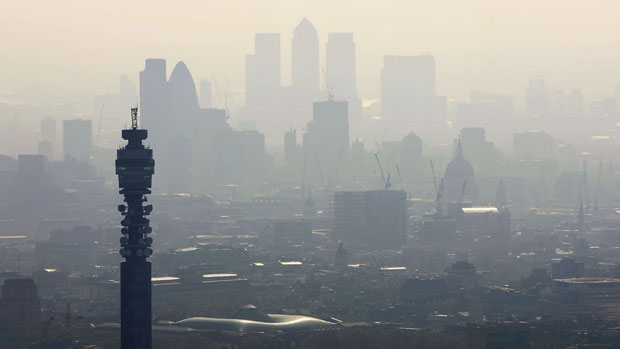Air pollution: Saharan dust brings dangerous smog to UK
People with heart and lung problems warned to take extra care as air pollution levels top the scale

A free daily email with the biggest news stories of the day – and the best features from TheWeek.com
You are now subscribed
Your newsletter sign-up was successful
AIR pollution is expected to be unusually high today in some parts of England and Wales, made worse by sand and dust swept up by storms in the Sahara.
The Department for Environment, Food and Rural Affairs (Defra) has warned that the high levels of pollution poses a threat to the health of elderly and vulnerable people.
How bad can it be?Defra has a ten-point scale for measuring air quality, with one indicating low levels of air pollution and ten indicating very high levels. Some areas in the UK are predicted to reach ten today, with The Guardian describing it as "one of the year's worst smogs".
The Week
Escape your echo chamber. Get the facts behind the news, plus analysis from multiple perspectives.

Sign up for The Week's Free Newsletters
From our morning news briefing to a weekly Good News Newsletter, get the best of The Week delivered directly to your inbox.
From our morning news briefing to a weekly Good News Newsletter, get the best of The Week delivered directly to your inbox.
Who will be affected?People with heart and lung problems have been warned to avoid "strenuous activity", while those with asthma have been told they may find they need to use their inhaler more often. Older people are also advised to reduce physical activity. Defra says that "anyone experiencing discomfort such as sore eyes, cough or sore throat should consider reducing activity, particularly outdoors".
Which areas will be affected?Experts are anticipating "high" or "very high" air pollution levels across much of England and Wales today. London and the South East, including parts of East Anglia, Kent and Essex, are expected to be worst hit. The high levels of pollution are expected to continue across East Anglia and the Midlands on Thursday, but is expected to ebb away by Friday.
What is it caused by?The pollution has been caused by a mix of local and European emissions, as well as sand and dust from the Sahara in North Africa, which was swept up by high winds and carried thousands of miles across Europe. Last weekend, some people found their cars to be covered in a light coating of red dust. "The dust gets caught by rain particles and that is how it ends up being visible on the ground," says Andrew Sibley, specialist forecaster for the Met Office.
Should we be concerned about air pollution?According to the World Health Organisation, air pollution is the world's single biggest environmental health risk, linked to around seven million deaths a year, mostly from heart and lung diseases. This week's warning is likely to draw attention to the UK government's "long-term failure to reduce air pollution", says BBC environment analyst Roger Harrabin. Following 15 years of warnings, the European Union has launched legal proceedings against the UK for failing to reduce "excessive" levels of nitrogen dioxide in the air, mostly caused by traffic. "Dirty air is an invisible threat," says Harrabin, "and it's taken a wind from the Sahara to blow it into UK headlines".
A free daily email with the biggest news stories of the day – and the best features from TheWeek.com
-
 Local elections 2026: where are they and who is expected to win?
Local elections 2026: where are they and who is expected to win?The Explainer Labour is braced for heavy losses and U-turn on postponing some council elections hasn’t helped the party’s prospects
-
 6 of the world’s most accessible destinations
6 of the world’s most accessible destinationsThe Week Recommends Experience all of Berlin, Singapore and Sydney
-
 How the FCC’s ‘equal time’ rule works
How the FCC’s ‘equal time’ rule worksIn the Spotlight The law is at the heart of the Colbert-CBS conflict